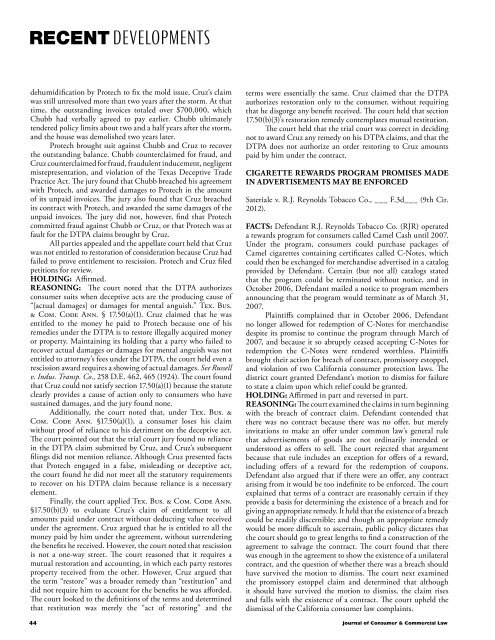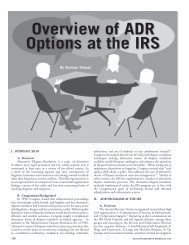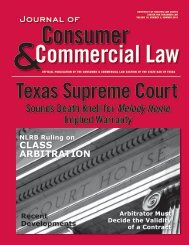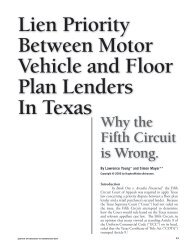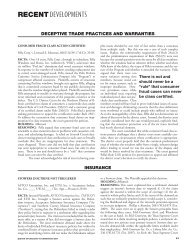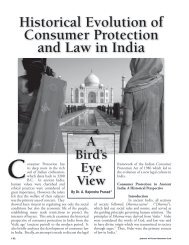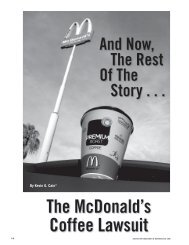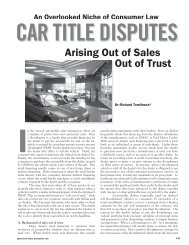Teaching Consumer Credit Law in an Evolving Australian Economy
Teaching Consumer Credit Law in an Evolving Australian Economy
Teaching Consumer Credit Law in an Evolving Australian Economy
Create successful ePaper yourself
Turn your PDF publications into a flip-book with our unique Google optimized e-Paper software.
RECENT DEVELOPMENTS<br />
dehumidification by Protech to fix the mold issue, Cruz’s claim<br />
was still unresolved more th<strong>an</strong> two years after the storm. At that<br />
time, the outst<strong>an</strong>d<strong>in</strong>g <strong>in</strong>voices totaled over $700,000, which<br />
Chubb had verbally agreed to pay earlier. Chubb ultimately<br />
tendered policy limits about two <strong>an</strong>d a half years after the storm,<br />
<strong>an</strong>d the house was demolished two years later.<br />
Protech brought suit aga<strong>in</strong>st Chubb <strong>an</strong>d Cruz to recover<br />
the outst<strong>an</strong>d<strong>in</strong>g bal<strong>an</strong>ce. Chubb counterclaimed for fraud, <strong>an</strong>d<br />
Cruz counterclaimed for fraud, fraudulent <strong>in</strong>ducement, negligent<br />
misrepresentation, <strong>an</strong>d violation of the Texas Deceptive Trade<br />
Practice Act. The jury found that Chubb breached his agreement<br />
with Protech, <strong>an</strong>d awarded damages to Protech <strong>in</strong> the amount<br />
of its unpaid <strong>in</strong>voices. The jury also found that Cruz breached<br />
its contract with Protech, <strong>an</strong>d awarded the same damages of the<br />
unpaid <strong>in</strong>voices. The jury did not, however, f<strong>in</strong>d that Protech<br />
committed fraud aga<strong>in</strong>st Chubb or Cruz, or that Protech was at<br />
fault for the DTPA claims brought by Cruz.<br />
All parties appealed <strong>an</strong>d the appellate court held that Cruz<br />
was not entitled to restoration of consideration because Cruz had<br />
failed to prove entitlement to rescission. Protech <strong>an</strong>d Cruz filed<br />
petitions for review.<br />
HOLDING: Affirmed.<br />
REASONING: The court noted that the DTPA authorizes<br />
consumer suits when deceptive acts are the produc<strong>in</strong>g cause of<br />
“[actual damages] or damages for mental <strong>an</strong>guish.” Tex. Bus.<br />
& Com. Code Ann. § 17.50(a)(1). Cruz claimed that he was<br />
entitled to the money he paid to Protech because one of his<br />
remedies under the DTPA is to restore illegally acquired money<br />
or property. Ma<strong>in</strong>ta<strong>in</strong><strong>in</strong>g its hold<strong>in</strong>g that a party who failed to<br />
recover actual damages or damages for mental <strong>an</strong>guish was not<br />
entitled to attorney’s fees under the DTPA, the court held even a<br />
rescission award requires a show<strong>in</strong>g of actual damages. See Russell<br />
v. Indus. Tr<strong>an</strong>sp. Co., 258 D.E. 462, 465 (1924). The court found<br />
that Cruz could not satisfy section 17.50(a)(1) because the statute<br />
clearly provides a cause of action only to consumers who have<br />
susta<strong>in</strong>ed damages, <strong>an</strong>d the jury found none.<br />
Additionally, the court noted that, under Tex. Bus. &<br />
Com. Code Ann. §17.50(a)(1), a consumer loses his claim<br />
without proof of reli<strong>an</strong>ce to his detriment on the deceptive act.<br />
The court po<strong>in</strong>ted out that the trial court jury found no reli<strong>an</strong>ce<br />
<strong>in</strong> the DTPA claim submitted by Cruz, <strong>an</strong>d Cruz’s subsequent<br />
fil<strong>in</strong>gs did not mention reli<strong>an</strong>ce. Although Cruz presented facts<br />
that Protech engaged <strong>in</strong> a false, mislead<strong>in</strong>g or deceptive act,<br />
the court found he did not meet all the statutory requirements<br />
to recover on his DTPA claim because reli<strong>an</strong>ce is a necessary<br />
element.<br />
F<strong>in</strong>ally, the court applied Tex. Bus. & Com. Code Ann.<br />
§17.50(b)(3) to evaluate Cruz’s claim of entitlement to all<br />
amounts paid under contract without deduct<strong>in</strong>g value received<br />
under the agreement. Cruz argued that he is entitled to all the<br />
money paid by him under the agreement, without surrender<strong>in</strong>g<br />
the benefits he received. However, the court noted that rescission<br />
is not a one-way street. The court reasoned that it requires a<br />
mutual restoration <strong>an</strong>d account<strong>in</strong>g, <strong>in</strong> which each party restores<br />
property received from the other. However, Cruz argued that<br />
the term “restore” was a broader remedy th<strong>an</strong> “restitution” <strong>an</strong>d<br />
did not require him to account for the benefits he was afforded.<br />
The court looked to the def<strong>in</strong>itions of the terms <strong>an</strong>d determ<strong>in</strong>ed<br />
that restitution was merely the “act of restor<strong>in</strong>g” <strong>an</strong>d the<br />
terms were essentially the same. Cruz claimed that the DTPA<br />
authorizes restoration only to the consumer, without requir<strong>in</strong>g<br />
that he disgorge <strong>an</strong>y benefit received. The court held that section<br />
17.50(b)(3)’s restoration remedy contemplates mutual restitution.<br />
The court held that the trial court was correct <strong>in</strong> decid<strong>in</strong>g<br />
not to award Cruz <strong>an</strong>y remedy on his DTPA claims, <strong>an</strong>d that the<br />
DTPA does not authorize <strong>an</strong> order restor<strong>in</strong>g to Cruz amounts<br />
paid by him under the contract.<br />
CIGARETTE REWARDS PROGRAM PROMISES MADE<br />
IN ADVERTISEMENTS MAY BE ENFORCED<br />
Sateriale v. R.J. Reynolds Tobacco Co., ___ F.3d___ (9th Cir.<br />
2012).<br />
FACTS: Defend<strong>an</strong>t R.J. Reynolds Tobacco Co. (RJR) operated<br />
a rewards program for consumers called Camel Cash until 2007.<br />
Under the program, consumers could purchase packages of<br />
Camel cigarettes conta<strong>in</strong><strong>in</strong>g certificates called C-Notes, which<br />
could then be exch<strong>an</strong>ged for merch<strong>an</strong>dise advertised <strong>in</strong> a catalog<br />
provided by Defend<strong>an</strong>t. Certa<strong>in</strong> (but not all) catalogs stated<br />
that the program could be term<strong>in</strong>ated without notice, <strong>an</strong>d <strong>in</strong><br />
October 2006, Defend<strong>an</strong>t mailed a notice to program members<br />
<strong>an</strong>nounc<strong>in</strong>g that the program would term<strong>in</strong>ate as of March 31,<br />
2007.<br />
Pla<strong>in</strong>tiffs compla<strong>in</strong>ed that <strong>in</strong> October 2006, Defend<strong>an</strong>t<br />
no longer allowed for redemption of C-Notes for merch<strong>an</strong>dise<br />
despite its promise to cont<strong>in</strong>ue the program through March of<br />
2007, <strong>an</strong>d because it so abruptly ceased accept<strong>in</strong>g C-Notes for<br />
redemption the C-Notes were rendered worthless. Pla<strong>in</strong>tiffs<br />
brought their action for breach of contract, promissory estoppel,<br />
<strong>an</strong>d violation of two California consumer protection laws. The<br />
district court gr<strong>an</strong>ted Defend<strong>an</strong>t’s motion to dismiss for failure<br />
to state a claim upon which relief could be gr<strong>an</strong>ted.<br />
HOLDING: Affirmed <strong>in</strong> part <strong>an</strong>d reversed <strong>in</strong> part.<br />
REASONING: The court exam<strong>in</strong>ed the claims <strong>in</strong> turn beg<strong>in</strong>n<strong>in</strong>g<br />
with the breach of contract claim. Defend<strong>an</strong>t contended that<br />
there was no contract because there was no offer, but merely<br />
<strong>in</strong>vitations to make <strong>an</strong> offer under common law’s general rule<br />
that advertisements of goods are not ord<strong>in</strong>arily <strong>in</strong>tended or<br />
understood as offers to sell. The court rejected that argument<br />
because that rule <strong>in</strong>cludes <strong>an</strong> exception for offers of a reward,<br />
<strong>in</strong>clud<strong>in</strong>g offers of a reward for the redemption of coupons.<br />
Defend<strong>an</strong>t also argued that if there were <strong>an</strong> offer, <strong>an</strong>y contract<br />
aris<strong>in</strong>g from it would be too <strong>in</strong>def<strong>in</strong>ite to be enforced. The court<br />
expla<strong>in</strong>ed that terms of a contract are reasonably certa<strong>in</strong> if they<br />
provide a basis for determ<strong>in</strong><strong>in</strong>g the existence of a breach <strong>an</strong>d for<br />
giv<strong>in</strong>g <strong>an</strong> appropriate remedy. It held that the existence of a breach<br />
could be readily discernible; <strong>an</strong>d though <strong>an</strong> appropriate remedy<br />
would be more difficult to ascerta<strong>in</strong>, public policy dictates that<br />
the court should go to great lengths to f<strong>in</strong>d a construction of the<br />
agreement to salvage the contract. The court found that there<br />
was enough <strong>in</strong> the agreement to show the existence of a unilateral<br />
contract, <strong>an</strong>d the question of whether there was a breach should<br />
have survived the motion to dismiss. The court next exam<strong>in</strong>ed<br />
the promissory estoppel claim <strong>an</strong>d determ<strong>in</strong>ed that although<br />
it should have survived the motion to dismiss, the claim rises<br />
<strong>an</strong>d falls with the existence of a contract. The court upheld the<br />
dismissal of the California consumer law compla<strong>in</strong>ts.<br />
44 Journal of <strong>Consumer</strong> & Commercial <strong>Law</strong>


